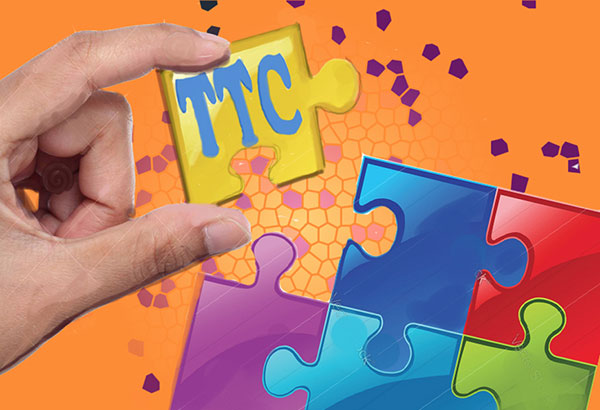The oft-missing piece of the business puzzle


Graphic by Scott Garceau
One of the saddest and most debilitating lessons a young business leader can learn is to equate increasing intelligence with increasing complexity. To equate quality with the number of PowerPoint slides or pages in a memo.
Nothing could be further from the truth.
Winning in business, in some shape or form, always comes down to winning with people. Whether it is appealing to consumers with a product or service or driving one’s organization to peak performance, it is a human game. You must win with people to win in business.
There are many proven psychological models that help predict human reactions to the world around them. Some of these “famous” psychological models we are all familiar with whether we recognize it or not: positive and negative reinforcement, which nearly every boss or parent practices daily; and Maslow’s need hierarchy, which factors into so much of the marketing we see today as more and more brands promise some degree of “self-actualization” through a brand experience. When a brand promises to build self-esteem or make you feel “cool,” this is, in essence, promising some degree of Maslow’s self-actualization.
One of the models not talked about so often but critically important to any business’ success is often known as the Theory of Task Complexity, or TTC for short.
What is TTC? Well, at the risk of oversimplifying, it relates to how complex a task is, and hence how a human being will approach the task. One of the most key elements to TTC is this: “Task complexity means that the more complex a task is, the less likely a human being will be to complete the task.”
When you boil down TTC to this simple idea, it becomes apparent how we see this in everyday life.
If someone is laying on the couch, TV remote in hand, they will endlessly surf stations to find the right program. Why? Because the complexity of the task — changing channels — is low. But suddenly take the remote control away, and people will lay on the couch and refuse to walk 1.5 meters to change the channel manually! They will lay there and watch a TV program they don’t even like! Why? It is not laziness. It is TTC. The more complex a task is, the less likely we are to do it. Adding two steps to the equation adds complexity to the task of changing channels. So many of us won’t do it.
Or, say a company wants to offer a wellness program to employees. So, they work a deal with a nearby gym that is 400 meters away, with discounted prices. The company gets X percent of employees to enroll. Well, data shows that if you put a lower-quality gym on-site, hence eliminating the 400-meter walk, enrollment will spike upwards at a dramatic rate. Why? It has nothing to do with inherent laziness, or that people don’t care about the quality of a gym. The answer is TTC.
There have been tons of email research. If you email a link to an online article to a group of people, you will get X percent of people to actually click on the link. However, if you go to the actual article, copy and paste it into the email, the readership of the article more than doubles! Why? Because adding the “click” to the link adds a step, and adds complexity. And this means less people will do the task! The more you make things simple, the more people will do the task. That’s TTC.
When I was a fresh psychology grad in the mid-1980s I joined P&G’s marketing department. One of the first projects I was given was in the lodging business, wherein P&G would sell the small-sized amenities of Pantene shampoo or Safeguard soap to hotels to place in their rooms. The whole proposition was, “Give your guests the brands they enjoy at home.”
One of the marketing ideas they were testing was a simple concept of going to a prospective hotel, giving them a supply of “test” products, placing these products in a set number of hotel rooms, and including a small survey for the guest to fill in regarding whether they liked having leading brand amenities in their room. The idea was, if you could prove to a hotel that their guests prefer Pantene or Safeguard, well, the sale becomes much more likely!
The good news was, most guests — over 75 percent — reportedly loved having brand-name amenities in their room — brands they could trust, a touch of home. But the bad news was, very few guests would fill out the survey card. So, when we would go back and meet the hotel management to make the sale, well, they often would balk at the low return rate. They didn’t “buy” the data because so few guests filled in the surveys.
So I was tasked with trying to improve the return rate. My boss encouraged me to look at some kind of “gift” concept, where we would give people a small gift for just filling in the three questions on the survey. Basically, this was bribing people to fill up the survey.
But, fresh from my formal education, I had another idea: let’s look at it from a task-complexity perspective.
We were just putting the survey with the amenities. The team thought, “Well, there is a pen in the room in the desk, so they have a pen within easy reach.” But this is flawed thinking when you put it in the context of TTC. People won’t walk one meter to change a TV channel without a remote control; do we really think they will search through a hotel room for a pen for a voluntary survey they don’t have to fill in?
So I suggested we put a small, no-cost golf pencil with every survey in each room, right on top of the survey card. I explained the issue of TTC. Making people search for a pen or pencil reduced the odds of people doing the task. If it’s a visa application in an embassy, we will search all over for a pen. But a voluntary survey in a hotel room? Forget it!
Well, my bosses were shocked. Suddenly the survey completion rate went over 50 percent, which was good enough. The program was deployed with huge success and many new hotels sold. All because we fixed one little issue of task complexity by giving out one little pencil!
TTC pops up every day in business if you are aware and looking for it, particularly in a world where we sometimes equate complexity with “intelligence,” or we confuse good work with length, meaning the longer, the better.
I was in a meeting recently for a proposed sales contest. The plan wasn’t very simple. It was a complex concept with converting sales to “points” and all kinds of caveats and minimums to earn the bonus. You had to sit and study the plan in depth to understand it! So, when you put yourself into the shoes of the average salesperson and how harried they are, would they take the time to understand this program? My sense was, under the learnings of TTC, and given that the bonus money was just okay, many would forget about it and ignore it just like we might ignore the complex promotion to win small prizes advertised in a retail store. It just isn’t worth it to stand and read all the rules of the promotion. This is TTC at work.
If any company in today’s digital world is exploiting TTC to win in the market, it is Amazon. TTC is the centerpiece of their entire business model. Consumers can choose to go to a mall, fight crowds, walk around searching for an item. Drive their car to and from the mall. Take hours to purchase one item. Or they can sit in the comfort of their own homes, search online at Amazon for the item they want, pick and pay in seconds, and it arrives in the next day or two. Amazon is already the world’s largest retailer. They are growing double-digits. And old icons like Sears are breathing their last breaths. It is only going to get worse and we are going to see many iconic retailers die in the coming years. Because now there are options that exploit TTC in a way we have never seen before.
The simpler a task is to perform, the higher the odds a human will perform it. This is an essence of the theory of task complexity.
Take a hard look at your business. Look at areas where you may be frustrated because “not enough people do X or Y.” It could be internal processes for your employees (too many forms to fill out?) or customers who don’t engage to the degree you’d like. Odds are, your issue rests in one area: TTC. You are making things too difficult, and thus people opt out of doing it.
And if you think complexity is a sign of intelligence and sophistication, think again. From the mouth of one Leonardo Da Vinci: “Simplicity is the ultimate sophistication.”
* * *
Questions and comments may be directed to Facebook, James Michael Lafferty.



















